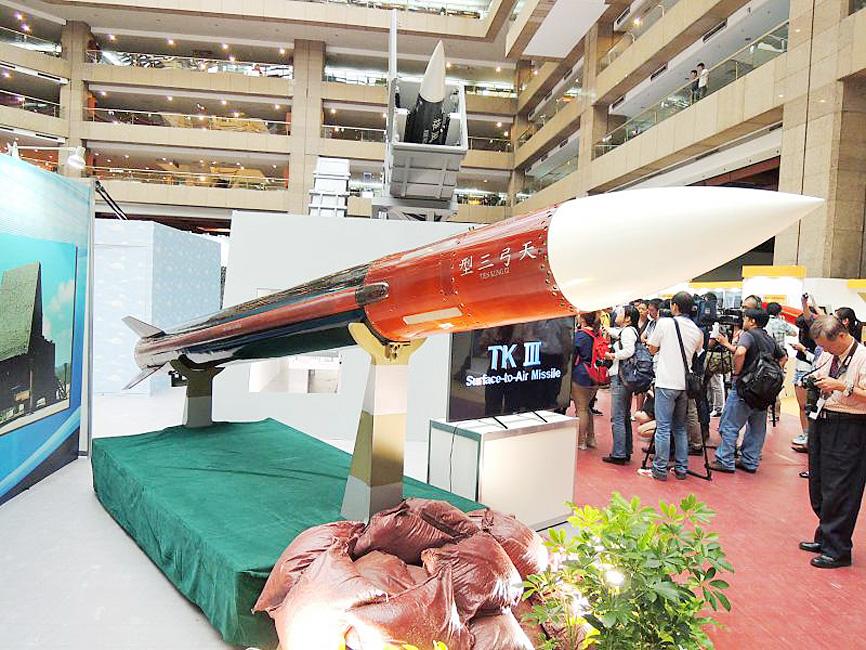Taiwan is developing missiles that can attack enemy air bases and bring down cruise missiles, and drones that can target their firing locations, a report by the military-owned body making the weapons said.
Taiwan last year approved NT$240 billion (US$8.2 billion) in extra military spending over the next five years as tensions with China have hit a new high and Chinese military planes have repeatedly flown through Taiwan’s air defense identification zone.
Taiwan plans to more than double its annual missile production capacity to close to 500 this year, the Ministry of National Defense said last month, as it boosts its combat power.

Photo: Lo Tien-pin, Taipei Times
In a report to the Legislative Yuan this week, a copy of which was reviewed by Reuters, the Chungshan Institute of Science and Technology offered more details of what the missiles and drones it is developing could do in a war.
The Hsiung Sheng land-attack missile, which experts say could have a range of up to 1,000km, comes in two versions: one with a high-explosive warhead to hit bunkers and hardened command centers, and the other with “dispersal” munitions to take out airfield facilities, it said.
Chieh Chung (揭仲), a researcher at the Taipei-based National Policy Foundation, said the Hsiung Sheng could reach most bases under the Chinese People’s Liberation Army’s Eastern Theatre Command, including those near Shanghai and the province of Zhejiang.
“It could greatly boost the national army’s capacity to delay or paralyze the communist forces’ pace of an invasion of Taiwan, making it hard for them to achieve a rapid war,” he said.
The advanced Sky Bow III surface-to-air missile is designed to take down ballistic and cruise missiles, as well as fighter jets.
Taiwan’s plans predate Russia’s invasion of Ukraine, but the war has prompted conversations about the lessons Taiwan could apply to fighting off a Chinese attack, including how Ukraine has resisted a numerically superior force.
One Taiwan-based Western security source said that although Taiwan was getting gear such as Harpoon anti-ship missiles from the US, its own missile program would help ensure the country would not have to rely on foreign supplies, as Ukraine has.
“It’s a hedging strategy,” the source said, speaking on condition of anonymity.
The institute said that drones, which Ukraine has used to great effect against Russia’s military, could attack enemy missile launch sites or act as decoys to help pinpoint enemy radars.
Four new facilities, including bases and repair plants, would be built by 2025 for the new drones, it said.
The ministry has previously announced plans to start manufacturing unspecified “attack drones,” with an annual production target of 48 such aircraft.
Little has been disclosed about the domestically produced drones. The first batch of US-made MQ-9 Reaper drones, which can be armed with missiles and operate at long range, is to enter service by 2025, the ministry said last month.
About 64 percent of Taiwan’s extra military spending, which came on top of planned military spending of NT$471.7 billion for next year, is to be spent on anti-ship weapons, such as land-based missile systems, including a NT$148.9 billion plan to mass produce homegrown missiles and “high-performance” ships.

A Ministry of Foreign Affairs official yesterday said that a delegation that visited China for an APEC meeting did not receive any kind of treatment that downgraded Taiwan’s sovereignty. Department of International Organizations Director-General Jonathan Sun (孫儉元) said that he and a group of ministry officials visited Shenzhen, China, to attend the APEC Informal Senior Officials’ Meeting last month. The trip went “smoothly and safely” for all Taiwanese delegates, as the Chinese side arranged the trip in accordance with long-standing practices, Sun said at the ministry’s weekly briefing. The Taiwanese group did not encounter any political suppression, he said. Sun made the remarks when

The Taiwanese passport ranked 33rd in a global listing of passports by convenience this month, rising three places from last month’s ranking, but matching its position in January last year. The Henley Passport Index, an international ranking of passports by the number of designations its holder can travel to without a visa, showed that the Taiwan passport enables holders to travel to 139 countries and territories without a visa. Singapore’s passport was ranked the most powerful with visa-free access to 192 destinations out of 227, according to the index published on Tuesday by UK-based migration investment consultancy firm Henley and Partners. Japan’s and

BROAD AGREEMENT: The two are nearing a trade deal to reduce Taiwan’s tariff to 15% and a commitment for TSMC to build five more fabs, a ‘New York Times’ report said Taiwan and the US have reached a broad consensus on a trade deal, the Executive Yuan’s Office of Trade Negotiations said yesterday, after a report said that Washington is set to reduce Taiwan’s tariff rate to 15 percent. The New York Times on Monday reported that the two nations are nearing a trade deal to reduce Taiwan’s tariff rate to 15 percent and commit Taiwan Semiconductor Manufacturing Co (TSMC, 台積電) to building at least five more facilities in the US. “The agreement, which has been under negotiation for months, is being legally scrubbed and could be announced this month,” the paper said,

Japan and the Philippines yesterday signed a defense pact that would allow the tax-free provision of ammunition, fuel, food and other necessities when their forces stage joint training to boost deterrence against China’s growing aggression in the region and to bolster their preparation for natural disasters. Japan has faced increasing political, trade and security tensions with China, which was angered by Japanese Prime Minister Sanae Takaichi’s remark that a Chinese attack on Taiwan would be a survival-threatening situation for Japan, triggering a military response. Japan and the Philippines have also had separate territorial conflicts with Beijing in the East and South China